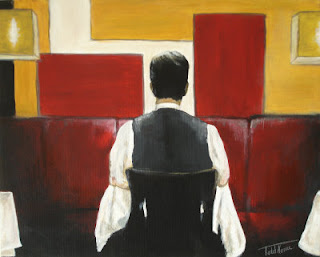Die, and Become
Some reconstructed quotes by the British monk Pelagius defending man's freedom of will and the place of God in it:
http://www.seanmultimedia.com/Pie_Pelagius_Defense_Of_The_Freedom_Of_The_Will.html
Replace his Biblical God by the Ultimate Reality, the Logos, the Buddha, Tao, etc and it still make sense and be acceptable.
I wonder where we stood today if Pelagianism or Celtic Christianity had prevailed in stead of the teaching of Augustine, which had Middle Eastern dualism and austerity sneak into European culture. For instance, our notion of death and dying would have been so different. Goethe's Stirb, Und Werde (Die and Become) would root out the fright and taboo that surrounds death and in stead, regarded it as a natural process to become more than life bounded by its rules and limitations, yet having them used to a type of existential upbreeding. If one would apply the Indo-european tripartite as context, the Father (Sky, Ultimate Reality, That-Which-Is) quickens us in the womb of the Mother (Life, earthly existence) and as the Son (us, exalted, like the Ressurected Christ or the Sun God in Heathenism) assume our final and greatest destiny. Eden or Annwn, no matter what denomination you are, is in this respect that realm of existence or dimension where we rise as our Archetypal Self.
Think of the sky, that despite the play of clouds and currents, the alternating cycle of night and day, possesses the quality of blue and stays therein true in itself. Life would be understood in a similar way and the temporart break of death, an agent or threshold, to attain immutable existence, ruling by itself, an archetype. It would fulfill the Buddhist idea of rebirth (think of the regenerative powers of a certain Timelord), but in stead of pursuing a repetitive downwards spiral, it would lead to a transfiguration, emulating and pefecting the general traits of an individual, beyond life and death.
http://www.seanmultimedia.com/Pie_Pelagius_Defense_Of_The_Freedom_Of_The_Will.html
Replace his Biblical God by the Ultimate Reality, the Logos, the Buddha, Tao, etc and it still make sense and be acceptable.
I wonder where we stood today if Pelagianism or Celtic Christianity had prevailed in stead of the teaching of Augustine, which had Middle Eastern dualism and austerity sneak into European culture. For instance, our notion of death and dying would have been so different. Goethe's Stirb, Und Werde (Die and Become) would root out the fright and taboo that surrounds death and in stead, regarded it as a natural process to become more than life bounded by its rules and limitations, yet having them used to a type of existential upbreeding. If one would apply the Indo-european tripartite as context, the Father (Sky, Ultimate Reality, That-Which-Is) quickens us in the womb of the Mother (Life, earthly existence) and as the Son (us, exalted, like the Ressurected Christ or the Sun God in Heathenism) assume our final and greatest destiny. Eden or Annwn, no matter what denomination you are, is in this respect that realm of existence or dimension where we rise as our Archetypal Self.
Think of the sky, that despite the play of clouds and currents, the alternating cycle of night and day, possesses the quality of blue and stays therein true in itself. Life would be understood in a similar way and the temporart break of death, an agent or threshold, to attain immutable existence, ruling by itself, an archetype. It would fulfill the Buddhist idea of rebirth (think of the regenerative powers of a certain Timelord), but in stead of pursuing a repetitive downwards spiral, it would lead to a transfiguration, emulating and pefecting the general traits of an individual, beyond life and death.


Comments